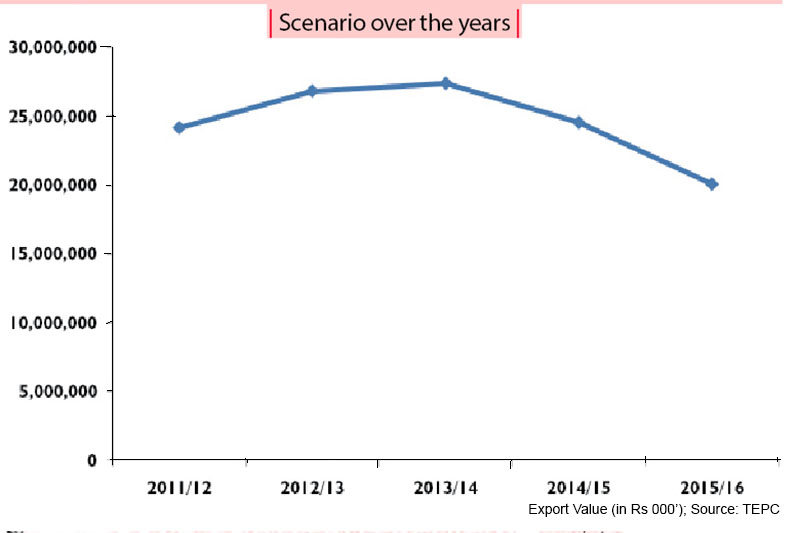Export growth of NTIS priority products plummets over time
Kathmandu, September 11
Export of priority products listed under Nepal Trade Integration Strategy (NTIS) has been plummeting over the years despite the government’s support in product development by mobilising the support of the Enhanced Integrated Framework (EIF) — an aid for trade mechanism for least developed countries established by various agencies including the World Trade Organisation.
The government had launched NTIS in 2010 and the export of NTIS products in 2010-11 was worth Rs 21.65 billion. However, such exports in last fiscal 2015-16 stood at Rs 20.11 billion, according to the Trade and Export Promotion Centre. Export growth of NTIS products has been sluggish since the initial year of its implementation. Export of NTIS products peaked at Rs 27.41 billion in fiscal 2013-14 but since then it continuously plummeted in fiscals 2014-15 and 2015-16.
Authorities at the Ministry of Commerce have said that the decline in export in the last two fiscal years was due to the earthquakes and border blockade, respectively. However, the export growth of NTIS products has not been satisfactory. “Despite the support from the government from production to value chain integration, the export of products listed under NTIS has been sluggish in the entire six-year period,” said Prachanda Man Shrestha, an international trade expert.
NTIS-2010 had listed cardamom, lentils, tea, medicinal herbs and essential oils, ginger, noodles and pasta, honey, iron and steel products, woollen and pashmina shawls, Nepali paper and paper products, woollen products, and articles of silver jewellery as priority export items of the country.
Three products under the strategy namely, pashmina, ginger and medicinal herbs and aromatic plants have received tier-II support from the EIF. Tier-II support is extended for productive capacity enhancement. The country has received $1.5 million under tier-I support for institutional capacity enhancement and $6.46 million under tier-II support for three projects. Under tier-II support, the International Trade Centre, Food and Agriculture Organisation and GIZ have been working in various areas to integrate the products into the global value chain and supporting the producers in the country to expand the production base of ginger, pashmina and medicinal herbs.
NTIS is the blueprint of the Ministry of Commerce to mobilise private sector investment and the development partners’ assistance. But there has been no substantial investment from the private sector in the areas of production and processing of the products in this period.
On the other hand, among all the NTIS products, three products namely, iron and steel, cardamom and pashmina cover over 60 per cent of the total export of NTIS products.
Export of NTIS products in the last fiscal accounted for under one per cent of the country’s gross domestic product (GDP) against the target of 2.5 per cent of GDP by fiscal 2015-16. The government has recently revised and is preparing to launch NTIS-2016, which has set a target to increase the contribution of NTIS products to GDP to four per cent by 2021.






